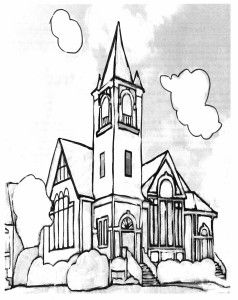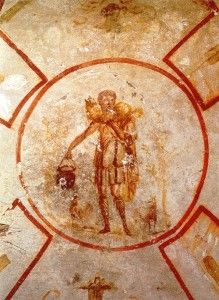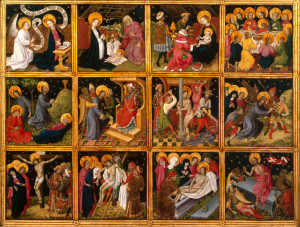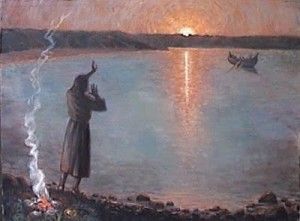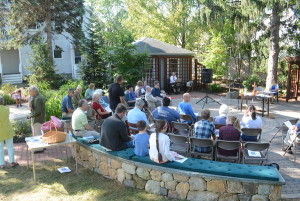 Our last Sunday in the garden for the summer included art projects for the kids, play dough for all, Chris singing at communion, back pack blessings, friendly fellowship, Sunday School and Youth registration, bubbles, and more! Here’s Hannah’s sermon and some pictures.
Our last Sunday in the garden for the summer included art projects for the kids, play dough for all, Chris singing at communion, back pack blessings, friendly fellowship, Sunday School and Youth registration, bubbles, and more! Here’s Hannah’s sermon and some pictures.
Psalm 139
Jeremiah 18:1-6
How can we become perfect?
This summer, I read a story about David: Michelangelo’s statue of the biblical hero who slew Goliath and went on to become one of the greatest kings of Israel.
 When the writer of this story encountered David for the first time, he was a young adult on a European tour, and he was completely overwhelmed. “Perfect,” he thought. He stood there for hours, taking it all in: a marble figure 17 feet tall, three times the size of a human being, and astonishing in every way: strong and graceful, stone and yet soft, full of detail and elegantly simple.
When the writer of this story encountered David for the first time, he was a young adult on a European tour, and he was completely overwhelmed. “Perfect,” he thought. He stood there for hours, taking it all in: a marble figure 17 feet tall, three times the size of a human being, and astonishing in every way: strong and graceful, stone and yet soft, full of detail and elegantly simple.
“Perfect,” thought the writer. But, as he discovered later on, David is not perfect. Far from it. David was carved from a massive block of marble that was badly selected; it is full of holes and veins. As the marble travelled to Florence, it fell into a muddy ditch. Once it arrived, it sat outside for 30 years, becoming dirty, dry, and brittle.
It’s hard to believe that Michelangelo 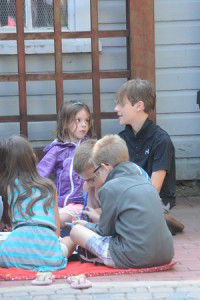 turned this beast of a block into a masterpiece. But he did. The people of Florence were very impressed, and David was installed as the key feature of their central square. But even after he was carved, David was not perfect. The center of gravity of the statue is slightly different than the center of gravity of the base. And over the years, the ground also shifted underneath the square in Florence where he was initially installed, so that David began to lean several degrees to the side. All this tilting did serious damage to his ankles. David now has hairline fractures that threaten his structural integrity.
turned this beast of a block into a masterpiece. But he did. The people of Florence were very impressed, and David was installed as the key feature of their central square. But even after he was carved, David was not perfect. The center of gravity of the statue is slightly different than the center of gravity of the base. And over the years, the ground also shifted underneath the square in Florence where he was initially installed, so that David began to lean several degrees to the side. All this tilting did serious damage to his ankles. David now has hairline fractures that threaten his structural integrity.
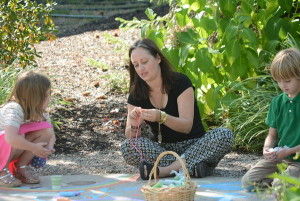 David has suffered other injuries, too. His left arm was broken in half during a riot. His right little toe has been lost multiple times. Someone took a hammer to his left foot. Finally, David was moved inside a museum for protection. He is now perfectly upright, protected from weather and vandalism. Still, because of the flaws in his ankles, an earthquake could bring him tumbling down at any time.
David has suffered other injuries, too. His left arm was broken in half during a riot. His right little toe has been lost multiple times. Someone took a hammer to his left foot. Finally, David was moved inside a museum for protection. He is now perfectly upright, protected from weather and vandalism. Still, because of the flaws in his ankles, an earthquake could bring him tumbling down at any time.
How can we become perfect? Perfection is the goal, it seems. We are 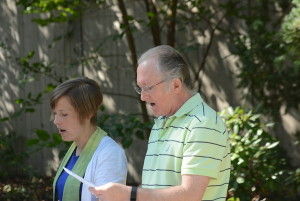 constantly offered products to help us conceal anything that our culture considers a physical imperfection. Even worse, we are taught to hide anything that might be considered an internal imperfection: grief, trauma, illness, addiction, betrayal, depression, unemployment, anger, debt. Messages within and outside of us urge us to be like David: larger and more beautiful than real life. And so we scramble to replace our missing toes, and repair our broken arms, and shore up the hairline fractures in our ankles, so that no one else finds out about them….so that we, too, might seem perfect.
constantly offered products to help us conceal anything that our culture considers a physical imperfection. Even worse, we are taught to hide anything that might be considered an internal imperfection: grief, trauma, illness, addiction, betrayal, depression, unemployment, anger, debt. Messages within and outside of us urge us to be like David: larger and more beautiful than real life. And so we scramble to replace our missing toes, and repair our broken arms, and shore up the hairline fractures in our ankles, so that no one else finds out about them….so that we, too, might seem perfect.
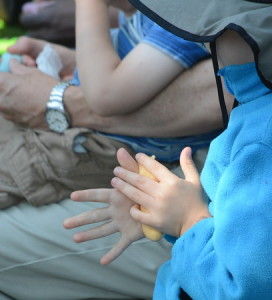 Praise be to the living God, for she has something else in mind for us. When God forms the first people in the book of Genesis, she uses earth; clay. She molds this clay with her own hands. Then, she breathes into it, bringing us to life.
Praise be to the living God, for she has something else in mind for us. When God forms the first people in the book of Genesis, she uses earth; clay. She molds this clay with her own hands. Then, she breathes into it, bringing us to life.
The passage from Jeremiah that we heard today reminds us that God is our potter not only at the beginning of time, but also throughout our lives. That clay that made us was never fired in a kiln. It has never become static or fixed, or hard and brittle like marble. We are a work in progress, soft and pliable, capable of being formed and reformed, converted and re-converted. No wonder it’s hard to give the impression that we are 17 feet of perfect marble. God made us to be small, beloved, imperfect and unfinished lumps of clay.
Sometimes we may wish that God was a bit more like Michelangelo, 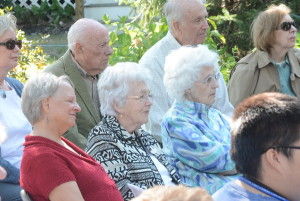 and we were a little more like David. Iconic beauty, international fame, and perpetual youth don’t sound so bad. But instead of fighting time and circumstance in the effort to keep up appearances, we get to embrace our inevitable change. God is our creator and recreator, and our life is an artistic partnership. We
and we were a little more like David. Iconic beauty, international fame, and perpetual youth don’t sound so bad. But instead of fighting time and circumstance in the effort to keep up appearances, we get to embrace our inevitable change. God is our creator and recreator, and our life is an artistic partnership. We 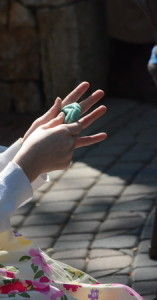 make plenty of mistakes along the way, the process is far from straightforward, but sometimes what starts out as a flaw or a tragedy can become the most beautiful part of a person. The goal we’re headed towards is not perfection or preservation or even completion, but a more responsive and joyful journey with God.
make plenty of mistakes along the way, the process is far from straightforward, but sometimes what starts out as a flaw or a tragedy can become the most beautiful part of a person. The goal we’re headed towards is not perfection or preservation or even completion, but a more responsive and joyful journey with God.
I brought some play dough with me today. For the next few minutes, I invite you to hold your clay in your hands, shaping it if you wish. Consider: how has God been molding you this year, this season, this summer? And, looking towards the fall, how do you long to be reformed by God?
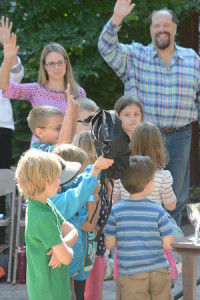
O Lord, you are our potter. You formed us with your hands long ago, and breathe us into life. You search us and know us in every moment, and lay your hand upon us. You rework us into new vessels, as it seems good to you. Open our hearts, so that instead of being perfectly brittle or privately broken, we may embrace our imperfections and the movement of your spirit, and be remade again and again and again. Amen.












